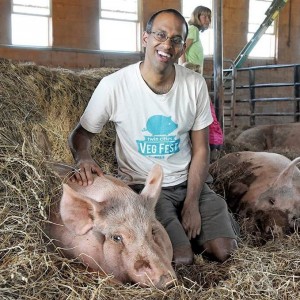
Dear supporters, volunteers, friends, and donors,
I’ve enjoyed working with Compassionate Action for Animals over the past eighteen years, first as founder and then as executive director for the last five. After careful thought, I realize the time has come for me to move on, and I’ll be stepping down from my staff position in January of 2017.
Having been deeply involved with CAA since its inception, I realize I need a break, including some time to relax. While I don’t have any specific plans, I intend to stay in Minneapolis, continuing on my path of becoming the most effective advocate for animals that I can be. I’d like to consider new strategies and turn my focus to influencing institutions, such as food service providers and the government. I’m also interested in having my work more closely align with advocating against racism, sexism, and other ways that our society exploits humans.
My life’s work is to promote compassion, and CAA has been an incredibly fulfilling vehicle for that work. I’m proud to say that CAA is currently in a strong financial position with thriving programs, high morale, and unprecedented volunteer support. I wholeheartedly believe in the work we do and encourage your continued participation. Please donate, volunteer, come to our events, and continue to speak out for animals. I believe that CAA has been and will continue to be a powerful and effective voice for the animals.
My wish is that my leaving will be an opportunity for you and the organization to become even more powerful forces for the animals. The role of executive director for CAA is an important one, and this transition will allow for other voices in the movement to have more leadership. In that, there’s a great potential for expanding diversity and strengthening the organization.
The board of directors is currently assembling a hiring committee and will be announcing the position opening soon. If you or someone you know might be interested in applying, please stay tuned for the job posting.
I look forward to working with you over the next few months as we continue our important work, and at the top of the agenda is Twin Cities Veg Fest. (The festival’s fundraising campaign is currently underway!) After my departure in January, I can be reached at [email protected], 612-293-6876, and on Facebook, Instagram, and Snapchat as unnypn. And of course you can find me biking on the streets of South Minneapolis (listen for my singing).
It’s been a pleasure working with you. I’m so grateful for all the progress we’ve made for the animals, and I’m also grateful for all the wonderful relationships I’ve developed with you. I look forward to all of that continuing into the future.
For the animals,
Unny Nambudiripad












